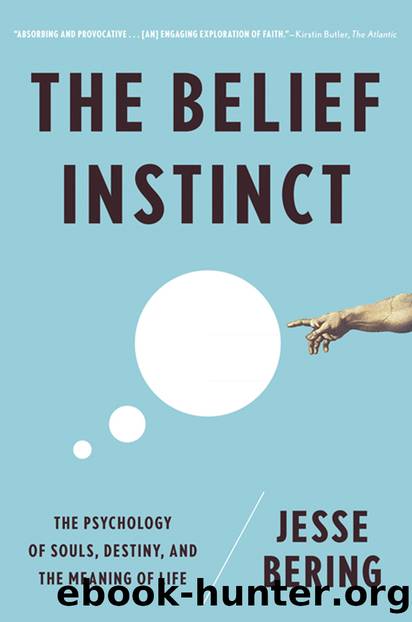The Belief Instinct by Jesse Bering

Author:Jesse Bering
Language: eng
Format: epub
Publisher: W. W. Norton & Company
Published: 2011-08-14T16:00:00+00:00
On the one hand, then, from a very early age, children realize that dead bodies are not coming back to life. On the other hand, also from a very early age, kids endow the dead with ongoing psychological functions, using their theory of mind. This conception may be at least partially why the idea of brainless zombies seems to us so implausible and the stuff of horror movies, limited to only a handful of cultures, whereas some type of spiritual afterlife, with the mindful souls of the deceased passing on to the other side, is by contrast strikingly mundane. So just where do culture and religious teaching come into the mix, if at all?
In fact, exposure to the concept of an afterlife plays a crucial role in enriching and elaborating this natural cognitive stance; it’s sort of like constructing an architectural scaffolding, except in this case culture develops and decorates the innate psychological building blocks of religious belief. The end product can be as ornate or austere as you like, from the headache-inducing reincarnation beliefs of Theravada Buddhists to the man in the street’s “I believe there’s something” brand of philosophy—but it’s made of the same brick and mortar. The idea of an afterlife, whatever the specifics, is guided by our intuitions, and these intuitions are enabled only by our illusion-generating theory of mind. Again, our theory of mind allows us to think about our own brainless minds after death, as well as those of our dead loved ones. From a basic cognitive science perspective, then, the specific nature of the afterlife belief is largely irrelevant; it makes no difference whether the soul is believed to ascend, descend, transmigrate, slumber, hover, or recycle. The point is that the soul is likened to personal consciousness, or some mindful “essence” of the individual, and is seen as being curiously immortal all the same.19
In support of the idea that culture enhances our natural tendency to deny the death of the mind, Harvard University psychologist Paul Harris and researcher Marta Giménez of the National University of Distance Education in Spain showed that when the wording in children’s interviews is tweaked to include medical or scientific terms, psychological-continuity reasoning decreases. In their 2005 study published in the Journal of Cognition and Culture, seven- to eleven-year-old children in Madrid who had heard a story about a priest telling a child that his grandmother was “with God” were more likely to attribute ongoing mental states to the decedent than were those who had heard the identical story but instead about a doctor saying a grandfather was “dead and buried.”20
And in a 2005 replication of the Baby Mouse experiment published in the British Journal of Developmental Psychology, David Bjorklund and I teamed up with psychologist Carlos Hernández Blasi of Jaume I University in Spain to compare children in a Catholic school with those attending a public secular school in Castellón, Spain. As in the previous study, an overwhelming majority of the youngest children—five- to six-year-olds—from both educational backgrounds said that Baby Mouse’s mental states survived after death.
Download
This site does not store any files on its server. We only index and link to content provided by other sites. Please contact the content providers to delete copyright contents if any and email us, we'll remove relevant links or contents immediately.
The Art of Thinking Clearly by Rolf Dobelli(8830)
Mindhunter: Inside the FBI's Elite Serial Crime Unit by John E. Douglas & Mark Olshaker(7823)
Change Your Questions, Change Your Life by Marilee Adams(6632)
Nudge - Improving Decisions about Health, Wealth, and Happiness by Thaler Sunstein(6626)
Mastermind: How to Think Like Sherlock Holmes by Maria Konnikova(6217)
The Power of Now: A Guide to Spiritual Enlightenment by Eckhart Tolle(4745)
Men In Love by Nancy Friday(4310)
Factfulness: Ten Reasons We're Wrong About the World – and Why Things Are Better Than You Think by Hans Rosling(4009)
The Confidence Code by Katty Kay(3557)
Thinking in Bets by Annie Duke(3525)
Man and His Symbols by Carl Gustav Jung(3308)
Three Women by Lisa Taddeo(2912)
The Worm at the Core by Sheldon Solomon(2910)
Why Buddhism is True by Robert Wright(2815)
Liar's Poker by Michael Lewis(2803)
The Inner Life of Animals by Peter Wohlleben(2763)
Descartes' Error by Antonio Damasio(2725)
The Power of Mindful Learning by Ellen J. Langer(2704)
The Slow Fix: Solve Problems, Work Smarter, and Live Better In a World Addicted to Speed by Carl Honore(2569)
